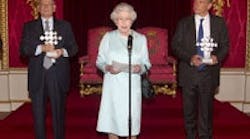In late June in a ceremony at Buckingham Palace in London, Britain's Queen Elizabeth II personally presented trophies to four of the five engineers awarded the inaugural Queen Elizabeth (QE) Prize for Engineering. They also will share £1 million (≈$1.5 million). The biennial prize was established in 2011 to recognize outstanding engineering-led advances that significantly impact the public and, in so doing, to give greater visibility to engineering achievements (see: "U.K. Launches Global Engineering Award").
In late June in a ceremony at Buckingham Palace in London, Britain's Queen Elizabeth II personally presented trophies to four of the five engineers awarded the inaugural Queen Elizabeth (QE) Prize for Engineering.
The winners — three Americans, Robert Kahn, Vinton Cerf and Marc Andreessen; a Briton, Tim Berners-Lee; and a Frenchman, Louis Pouzin — were honored for their contributions to the development of the Internet and World Wide Web.
The judges' citation succinctly summarizes the impact of their work:
"The Internet and the Web have revolutionized the way we communicate and enabled the creation of whole new industries. Today, a third of the world's population use the Internet and it is estimated that it carries 330 Petabytes of data per year, enough to transfer every character ever written in every book ever published 20 times over. There are about 50 billion pages on the Web. The Internet and the Web have changed the world...
[pullquote]
"Robert Kahn, Vinton Cerf and Louis Pouzin made seminal contributions to the protocols that together make up the fundamental architecture of the Internet.
"Tim Berners-Lee created the World Wide Web and thereby vastly extended the use of the Internet beyond email and file transfer.
"Marc Andreessen, while a student and working with colleagues, wrote the Mosaic browser that was widely distributed and which made the Web accessible to everyone and triggered a huge number of applications unimagined by the early network pioneers.
"While Kahn, Cerf, Pouzin, Berners-Lee and Andreessen made major contributions to the development of the Internet and Web, these systems were the result of collaboration through the use of open standards involving engineers all over the world."
A 15-person panel of judges selected the winners. Its members came from China, Germany, India, Japan, Saudi Arabia, the U.K. and the U.S. Three judges have strong chemical engineering credentials: Frances Arnold, a professor of chemical engineering, bioengineering and biochemistry at Caltech, Pasadena, Calif.; Lynn Gladden, Shell professor of chemical engineering at the University of Cambridge, Cambridge, U.K.; and Hiroshi Kamiyama, president of the Engineering Academy of Japan, Tokyo, who holds a doctorate in chemical engineering.
"We had originally planned to award this prize to a team of up to three people. It became apparent during our deliberations that we would have to exceed this limit for such an exceptional group of engineers," explains Lord Broers, chair of the panel of judges.
"Engineering has no recognition among the prestigious Nobel prizes and we certainly hope that the Queen Elizabeth Prize will become recognized as of equal standing," notes Gladden. "I hope that this prize informs and educates people from every walk of life and every age group about engineering and its role in society — past and present. Inevitably, the big win that we hope for is that the younger generation engages with engineering and understands what it is — and finds it exciting," she adds.
Nominations for the next prize, to be awarded in 2015, will open next year.
An independent foundation administers the prize. Its founding donors include BAE Systems, BP, GlaxoSmithKline, Jaguar Land Rover, Royal Dutch Shell, Siemens, Sony, Tata Consultancy Services and Toshiba.
The website of the QE Prize for Engineering (www.qeprize.org/) provides background on the winners' achievements, as well as details on the prize, judges and more.
Be sure to check out his Google+ page.


